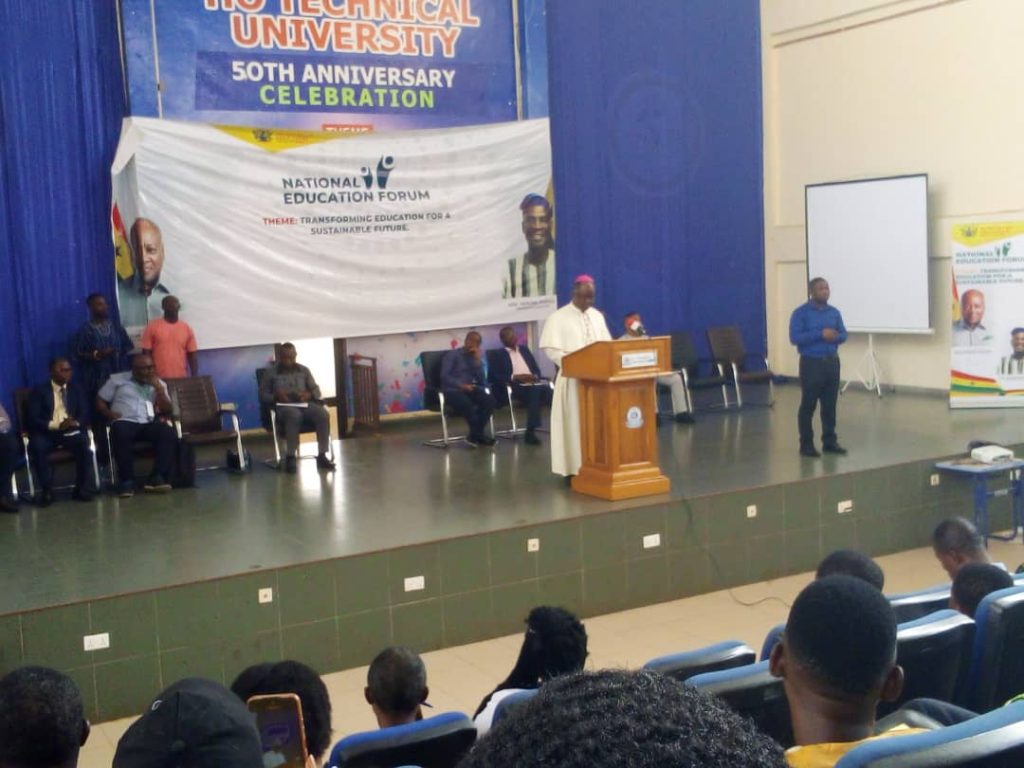|
Getting your Trinity Audio player ready...
|
Most Reverend Emmanuel Kofi Fianu, Bishop of Ho Diocese, has voiced out the Catholic Church’s discontentment to treatment from its major actors including politicians and governmental appointees in the running of its schools, in particular.
He said this non-compliance by these actors poses serious worries and has affected the partnership that existed between the government and the Catholic Church in the formation of education in the country. He said some appointments and transfers to and from Catholic schools were exacted without informing the Church, which left the Church wondering, whether they were proceeding in the right path. Bishop Fianu raised these concerns in a remark, which were affront to the development of educational enterprise during the Zonal observance of the National Education Forum (NEF), which is underway in Ho.
It is themed: “Transforming Education for a Sustainable Future.” He added that the dissemination of information on educational matters without reaching out to the religious stakeholders such as the Catholic Church, was not acceptable. Bishop Fianu contended that the unfriendly nature of some Directors of Education to the Catholic Church, “does not in any way promote collaboration in the delivery of quality education.” Again, he said lack of opportunity for the Church to be involved in the management of the schools thus eroding the faith identity of our schools.
The Bishop of Ho Diocese said the exclusion of religious representatives of religious bodies from the GES Council in its last Act, which was approved by the 7th of the 8th Parliament of the Fourth Republic, is of a concern for us and we look forward to the emission of this Act. “The Church wishes to emphasise religious, moral, ethical, and civic education in our schools because we believe this will lead to the promotion of responsible and productive citizens and not just knowledgeable individuals, who will be social misfits.”
Other concerns were the use of Catholic School compounds for structural development without any engagement with the Church was in bad taste, the over-population of second-cycle schools, which affected teacher-student ratio and teacher-contact hours as well as the infrastructural deficit in our schools and the pressure it puts on existing structures that were meant for lesser student’s population is also a concern. He said Catholic schools are an extension of the Church’s faith, and the Church wishes to appeal that newly recruited teachers, who are Catholics to their Schools in order to keep the Catholic faith and identity alive. “Let us all cease this opportunity to remind ourselves about the memorandum of understanding that exists between the Government of Ghana and the Mission and Unit Schools for effective collaboration and unity of purpose in the delivery of desired educational outcomes.
“The Catholic Church, on behalf of all the Mission and Unit Schools and on their own behalf, looks forward to receiving a written policy direction by this Committee on the partnership between Mission and Unit Schools and the Government on the management and delivery of quality education.” Bishop Fianu thanked President John Mahama and the Planning Committee for correcting the initial mistake to subsequently extend invitation to the Church, “for this we are grateful,” believing that their concerns would set the agenda to reset the sector. Professor Ben Q. Honyenuga, Vice Chancellor of Ho Technical University said the Forum offers an opportunity to reset the educational system, which is a hallmark for development, to look more futuristic and therefore demanded strategic planning.
He said there was need to ponder on quality, strengthen infrastructure, role of faith-based institutions. He challenged participants to express their thoughts freely in order to add value to the national discourse. Prof Smile Dzisi, Member of the Planning Committee said the NEF is in fulfillment of President Mahama’s campaign promise to reset education for national development and sustainable future. She said the engagement session in the Volta Region is part of a nationwide consultation process, allowing citizens to express their views and contribute to shaping the future of education in Ghana. The insights gathered will be instrumental in developing a comprehensive policy framework that ensures long-term sustainability and growth in the education sector.
Source: GNA


